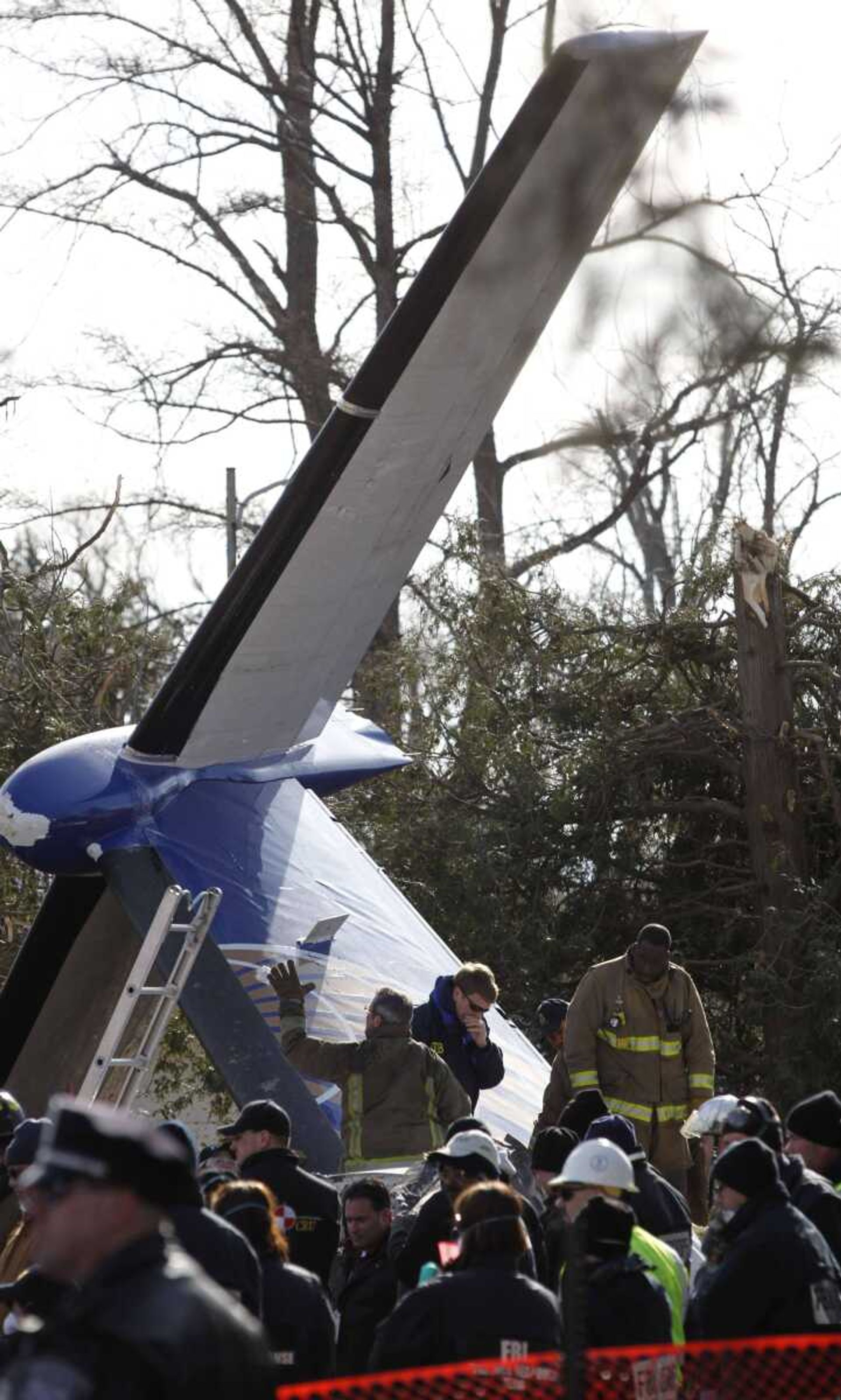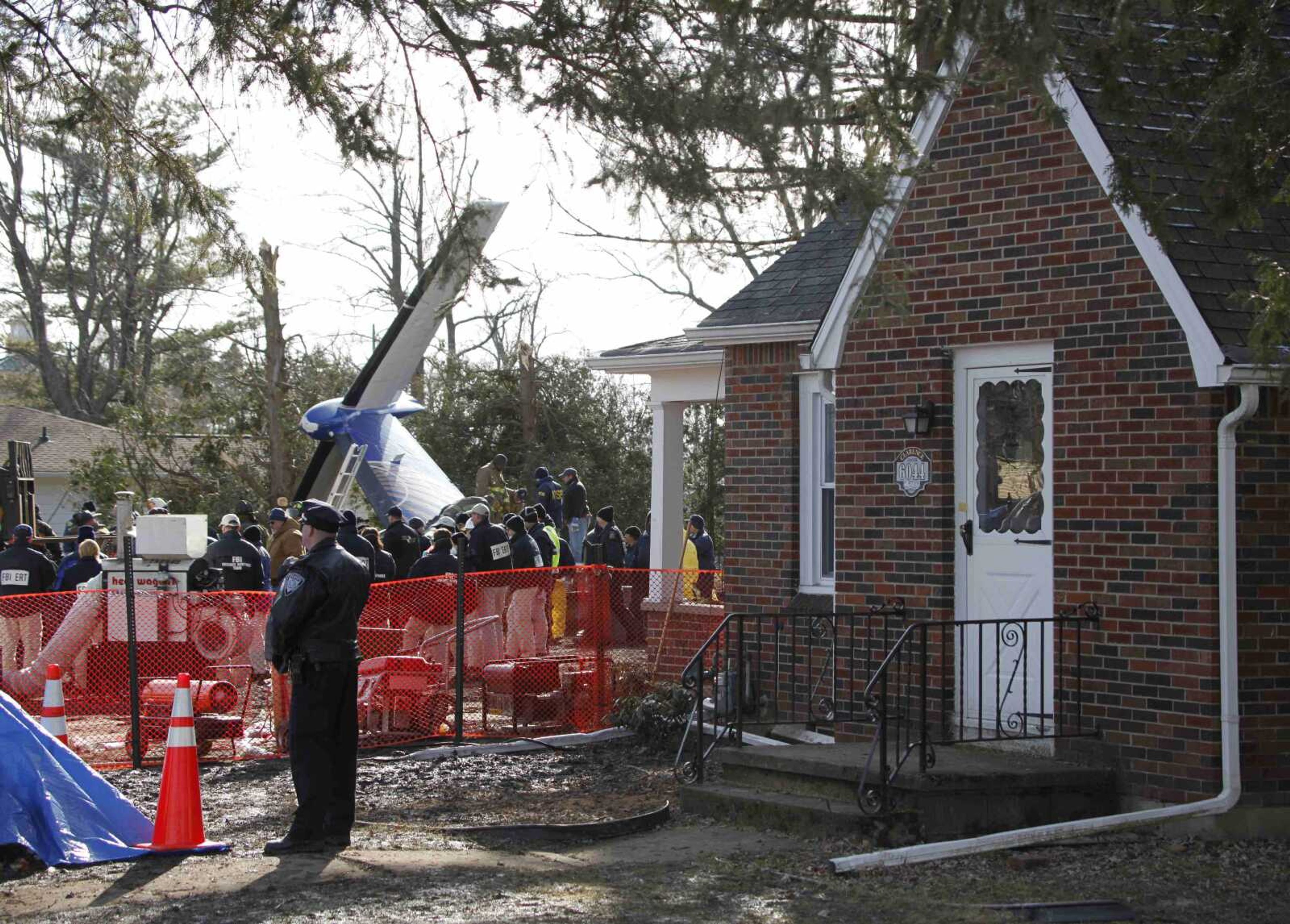Buffalo crash opened window into lives of commuter pilots
CLARENCE, N.Y. -- Long-suffering pilots for commuter airlines say it's about time that Washington and passengers alike pay attention to the cockpit, after a federal hearing into the deadly crash of Continental Connection Flight 3407 exposed pilots who may have been exhausted, undertrained -- and paid less than the bus or cab drivers who'd ferried their passengers to the airport...
CLARENCE, N.Y. -- Long-suffering pilots for commuter airlines say it's about time that Washington and passengers alike pay attention to the cockpit, after a federal hearing into the deadly crash of Continental Connection Flight 3407 exposed pilots who may have been exhausted, undertrained -- and paid less than the bus or cab drivers who'd ferried their passengers to the airport.
"We have been calling for years trying to get the public to understand what their lifestyle is really like," said Capt. Paul Rice, first vice president of the Air Line Pilots Association, International, the nation's largest pilot's union, representing 54,000 fliers.
Like Flight 3407's co-pilot, Rebecca Shaw, Capt. Dave Ryter earned around $17,000 in his first year with a regional carrier and flew coast-to-coast just to get to work because of his placement in Miami.
"My wife held down a job and we lived in an apartment about 45 minutes north of Los Angeles International [Airport] and scraped by," said Ryter, who has 10 years with his regional airline and is a union officer with ALPA.
Regional carriers like Ryter's, and Shaw's employer, Colgan Air, handle about half of all domestic departures and about a quarter of the passengers, about 160 million yearly, often flying under the names of their larger partner airlines, like Continental or USAir.

But with smaller planes, shorter routes and less experienced pilots, they pay considerably less than their larger counterparts, despite pilot schedules that can include multiple daily flights for six days in a row.
Rice described draining 14- to 16-hour duty days, much of that time unpaid and spent waiting in crew lounges. With no food on planes, pilots grab meals on the run from airport fast-food stands. Perks like holiday and overtime pay don't exist, he said.
To earn six to eight hours of pay, "you can come to work at seven in the morning for an eight o'clock departure and park your last flight at nine o'clock that night," said Rice, whose union favors tougher FAA regulations on how many consecutive hours pilots can fly or be on duty. The issue has lingered on the agendas of the FAA and the NTSB since the mid-1990s.
The National Transportation Safety Board's recent three-day hearing into the Feb. 12 crash near Buffalo that killed 50 people set off a cry in Congress for a review of safety at regional carriers, including training, scheduling and pay issues.
The Senate Commerce, Science and Transportation Committee has scheduled hearings Wednesday and June 17 on pilot fatigue and safety. A House hearing is also planned for June, although no date has been set.
Pilots said fatigue and lower pay are eroding the quality of pilots entering the airline industry, both at regional and major carriers.
"It used to be that airline pilot jobs were a coveted position," said veteran pilot Jeff Skiles, the first officer of US Flight 1549, which collided with Canada geese after takeoff from New York's LaGuardia Airport in January and ditched into the Hudson River.
"But even at the major airline level, with the bankruptcies and how they've decimated our contracts, it's just not an attractive job anymore," Skiles said. "People aren't leaving the military to become pilots -- there are plenty of other options. For instance, corporate flying has exploded quite a bit. What you're finding is the qualifications of the entry-level pilots in the traditional airline business have gone from adequate to very inadequate."
During last month's annual meeting of the Regional Airlines Association, one executive said the NTSB hearing into the Flight 3407 crash provided a skewed view of safety in an industry that, he said, treats entry-level professionals no differently than any other industry.
"We have a very robust safety management system in place," said Joseph Randell, president and chief executive of Air Canada Jazz. "In a lot of industries, entry-level conditions are onerous for junior people who come in at a lower pay. There's nothing unique about the airline business in that respect."
Russell "Chip" Childs, president and chief operating officer of Delta partner SkyWest Airlines Inc., said his company's research shows no correlation between pay and proficiency.
"People need to understand also that first-year pilot pay is a little bit lower because the companies put in $30,000 in training costs into that individual that first year. That's very well accepted," Childs said.
"Regional airlines pay so little at that entry level because they can," said Louis Smith, a retired Northwest Airlines captain and president of FltOps.com, which tracks the industry for those inside it. "And the pilots are getting compensated in two ways: One is income, the other is the all-important qualifications, jet time, (pilot-in-command) time, basically trying to get as much experience so they can leave as soon as possible, in many cases.
"You can't live off the second compensation, which is experience," he said, "so you either rely on friends or family or you cut down to the bare bones and try to survive the hard times."
Shaw, who chatted with Capt. Marvin Renslow about career options during the flight, lived with her husband and parents near Seattle. Getting to her Newark, N.J., base the night before the crash meant a redeye aboard a FedEx plane to Memphis and then another flight to Newark.
That struck Dan Marzolf as "crazy."
"I wouldn't want to have to travel for 10 hours and get on an airplane and do my job," said Marzolf, whose sister Jean Marie Srnecz was killed when Flight 3407 crashed on a house as it approached Buffalo Niagara International Airport.
"They should be in the area 24 hours ahead of time and there should be a place for them to stay," Marzolf said. "It may mean passengers paying a little more money, but I'd gladly pay a little more money to know that my pilot was well-rested and ready for the job."
Airport crew lounges are stocked with recliners suitable for a few winks, but they're not supposed to be slept in.
Still, it happens.
NTSB hearing testimony indicated Shaw talked of a couch with her "name on it" the morning of the crash. It is unclear where Renslow, who was in the middle of a two-day assignment, slept the night before the trip, but he logged into a computer from Colgan's crew room in Newark at 3 a.m. on the day of the flight, according to NTSB documents.
"They don't have the money to get a nice hotel room with blackout curtains and an air conditioner and get three or four hours or sleep if they get there early enough to be ready to go," said Joe Mazzone, a retired Delta Airlines pilot. "You go to the crew lounge ... you sit down and you put your hat over your eyes and you try to get a few nods in the recliner before you sign in so you're a little more refreshed. That's what's going on."
But he said those conditions "open up a large window of vulnerability" in the cockpit, especially when pilots are inexperienced and lack the confidence that comes with time at the controls.
"One or two little errors can be tragic," he said.
Flight 3407 experienced an aerodynamic stall on approach to Buffalo Niagara International Airport before plunging into a house. All 49 people on board and a man in the house were killed. Testimony and documents indicate Renslow and Shaw made a series of critical errors, some of which may be related to fatigue, inexperience and inattention to regulations.
While NTSB investigators calculated Shaw was paid just over $16,000 in her first year with Colgan, airline officials said later her salary was $23,900. Renslow's salary was estimated at $55,000 to $67,000.
-----
Contributing to this report were Associated Press Writers Paul Foy in Salt Lake City and Joan Lowy in Washington.
Connect with the Southeast Missourian Newsroom:
For corrections to this story or other insights for the editor, click here. To submit a letter to the editor, click here. To learn about the Southeast Missourian’s AI Policy, click here.









